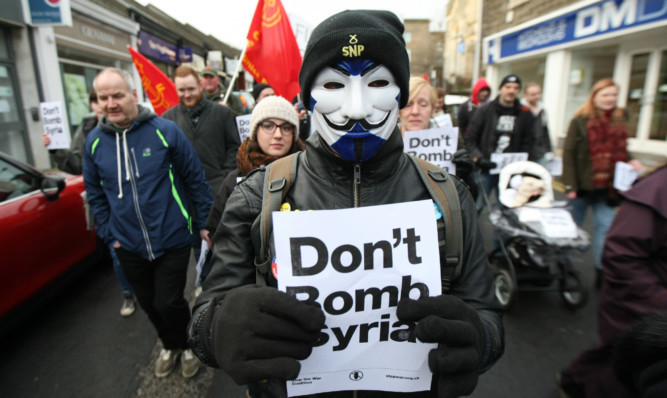Ask former teacher Aidan Canavan why Scotland should be taking in refugees from war torn Syria, and he will tell you the story of his encounters with genocide survivors in Rwanda six years ago.
Aidan, now 37, was a biology teacher at Kilsyth Academy in North Lanarkshire when he took a group of around 30 senior pupils on a school trip to the African state.
Visiting places where, between April and June 1994, an estimated 800,000 Rwandans were massacred in the space of 100 days, he felt like he was “almost on a horror tourism trip” and was not prepared for the lasting impact it was to have on him.
But what moved him most was that the Rwandan survivors of brutal torture, murder and rape were glad he and the pupils came.
They felt that the world had ignored their plight at the time of the massacre and were pleased that, at last, notice was being taken.
“It was the scale of the genocide that struck me,”Aidan told The Courier from his home on the isle of Bute.
“Every single person we met on that trip was a survivor of horrendous atrocities.
“It was difficult to come to terms with what they had been though.
“And it’s the same sort of atrocities that thousands and millions of Syrian refugees are experiencing now.
“The world stood by and let the horrors of Rwanda happen. Well I for one am not prepared to stand back and let the world do nothing again when it comes to helping the Syrians.”
Originally from Stirling, the married father was a teacher for 10 years before packing it in to open a brewery in the island community of Rothesay on Bute around 15 months ago. His motivation for change came about because, whilst living on the island, he was teaching on the mainland and wanted to be closer to home with his young family.
Yet it’s those life lessons taught as a teacher in Rwanda which have inspired him to become one of 50 volunteers who have rallied together on Bute to welcome 15 Syrian migrant families to the island the first to arrive in Scotland.
Canavan concedes that the community is split and some islanders are directly opposed to it. There are some people who are “very, very scared” especially after what happened in Paris. There are others who think that Scotland should be putting its own people first.
The island’s population is now roughly 6,300, and is described as aging, mostly white, and not very multicultural.
But he has every faith in the authorities to properly security vet the new arrivals, and believes doubters should give the refugees a chance. In fact, he is of the view that Britain should be taking many more than the 20,000 it plans to take by 2020.
He said:” I understand why some people are concerned, but I don’t think we can stand back and do nothing just because we gave been fortunate enough to be born in this country.
“In my opinion, many don’t fully understand what’s happening with these people. These are not economic migrants, these people are basically the same as us. They’re coming from a country that is war-torn that they had to leave. They’re not leaving to find a better life, they’re leaving for a safer life.
“They have lived in fear of murder, torture, rape. Why else would you jump in a boat, put your children in a boat, and threaten their lives just coming across the sea? They’re leaving because there were no other options.”
Aidan is proud of the way dozens of local islanders have stepped up to volunteer to welcome the migrant families and to help them overcome cultural, language, and other issues they may bring with them.
And he’s excited by the different culture, foods, and religions that have presented themselves on the island and is sure many new friendships will be forged as well.
He added: “The local authority will be providing things like housing and schools. Our group of volunteers, ranging from social workers to teachers to doctors will be using our skills to help these new families however we can and to make them feel welcome.
“I have offered my skills as a teacher I don’t expect my skills as a brewer will be much use as they are Muslims and don’t drink!
“But there are other things we can do to help them integrate into society. At Easter, for example, let’s have a festival where they can show us how to make their foods.”
Aidan said the refugees coming to Bute had been “mapped” based on their circumstances. They were all coming from rural areas into another rural area.
But he laughs when asked how they might react to the grim Scottish weather – Syria is often arid and sweltering whilst Bute can be bitterly cold and wet.
“Poor sods!” he jokes, “but I’m sure they’ll just be glad to be somewhere safe.”
